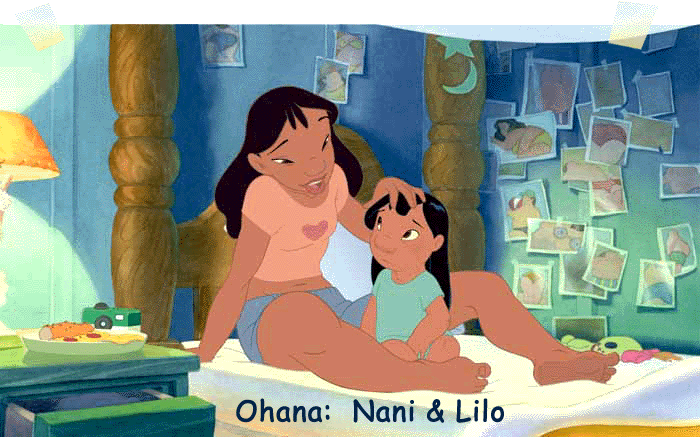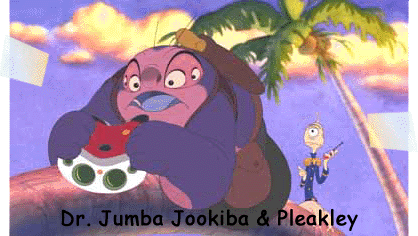
Lilo & Sitch is the strangest Disney feature cartoon in a long while, possibly ever. Gone are the songs by Alan Menken, Elton John, and (shudder) Phil Collins, banished by those of The King himself--Elvis Presley. A recent austerity campaign in the animation departments resulted in a free and funky look for L&S, from the water color backgrounds to the characters (some lifted from Winnie the Pooh and Mulan, and the costumes are simply drawn--the number of stripes on Nani's bikini, for instance, were reduced from eight to three in pre-production). Furthermore, the traditional cell animation is augmented by photo of Elvis and a clip of the fifties monster flick Tarantula.
The story of an escaped genetically engineered monster who escapes to earth and uses a little girl as a human shield is not exactly traditional Disney, either. Clearly the marketing department didnŐt know what to do with the film; the advertising consisted of other Disney characters eyeing the odd blue creature with disgust and scorn. Now, you'd expect that sort of thing from the cast of The Lion King--monarchical governments tend to engender a certain amount of snobbery--but, jeez, I thought Belle was supposed to be nice. The whole campaign seemed to have one message: Stitch would never, ever be seated with the popular Disney characters.
To his credit, Stitch seems not to mind and flashes a big sociopathic grin in the posters. He is a monster, after all. But Lilo is a little girl with weird ideas, dorky clothes, and no money for Barbies. The rejection she faces is reminiscent of what Stitch faced in the movie's previews, but being human, she feels the snub. Like when Lilo's peers sneak off during her imaginative disquisition about why her homemade doll doesn't look like theirs. She throws it to the ground and stomps away. A few steps later, however, she returns and gathers the doll in her arms, giving it a big conciliatory hug. After all, until she meets Stitch, it's the only friend she has.
And in the beginning, Stitch only sticks by her because intergalactic bounty hunters will kill him if he doesn't. Stitch is a destructive jerk by nature. Designed to wreak havoc on large cities, he is at a loss when he finds himself on a sleepy Hawaiian island. He finds petty vandalism diverting but ultimately unfulfilling, and feels pangs of helpless desolation. "What must it be like," his creator (and would-be destroyer) muses, "to have no higher purpose?"
Lilo (a Hawaiian word for "lost") does sense a higher purpose, beginning with natural law. Her first dialogue in the movie is an explanation that she had to buy peanut butter because she couldn't feed the fish she subsidizes a tuna sandwich. "I'd be an abomination!" she says. Curiously, in part because when was the last time you heard the word "abomination" in a kids' movie, Stitch is called an abomination, not only because he is a lab created monster, but because he has no sense of decorum. When Lilo bites somebody, she is remorseful and apologizes. When Stitch does, he cackles with glee. ("Does this look infected to you?" both of their victims ask.)

Lilo is also a believer in "ohana." "'Ohana' means family," Lilo explains, "and family means nobody gets left behind. Or forgotten." It's a sentiment that Lilo and her teenaged sister/guardian Nani, as orphans, feel keenly. Stitch doesn't remember a family, but is moved by a story book image of a solitary Ugly Duckling crying out "I'm lost!", then on the next page being joined by others like him.
Stitch develops a sort of cargo cult attitude toward the image, and enacts it with the hope of attracting a family of his own. This pagan ceremony recalls Lilo's activities with a handful of dolls made of spoons and a book entitled Practical Voodoo. "My friends need to be punished," she says. But when Stitch leaves with her copy of The Ugly Duckling, Lilo views the scene as another abandonment. "But I'll remember you," she says. "I remember everybody."

Lilo's already fractured family is headed toward a final blow at the hands of an MIB social worker named Cobra Bubbles. Nani tries hard, but is overwhelmed by the sudden responsibility of parenthood to a sister who, in misreading visual cues, insists to Bubbles that she is disciplined real good! Five times a day! With bricks and a pillowcase! The presence of an ill tempered, "evil koala" looking thing (even one trying to become a model citizen) and his two alien stalkers is more than Lilo and Nani's fragile home can stand. Literally, as it turns out--their place is leveled in a battle between Stitch, his mad scientist creator Dr. Jumba Jookiba, and a cross dressing EPA weenie type named Pleakley who believes mosquitoes are an endangered species.
Cobra Bubbles does a little legal maneuvering ("Aliens are all about rules," he says), and persuades the Councilwoman to exile Stitch to earth rather than a lonely asteroid. She also washes her hands of Jookiba and Pleakly, effectively stranding them. So, the aliens convert their defunct spaceship into a wing of the home they help Lilo, Nani, and Nani's hopeful suitor David rebuild. In contrast to Ian and Toula Miller becoming subsidies of her family and Peter Parker's self-imposed aloofness, the family at the end of Lilo & Stitch cobbles itself together and makes something unique. Far from being an "all you need is love" sap-fest, the alliance of humans and aliens depends on order and utilitarianism as much as affection. Their family is like the hula group in which Stitch joins Lilo--attractive and fun to be sure, but you have to learn the steps and keep in line.
(Written by Sharon C. McGovern)
From
Volume 35
Back to Cobra Movies
